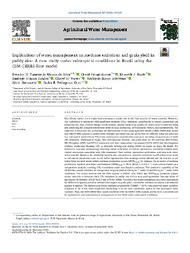 Busca de Publicações
Busca de Publicações
Implications of water management on methane emissions and grain yield in paddy rice: a case study under subtropical conditions in Brazil using the CSM-CERES-Rice model.
Author(s): SILVA, E. H. F. M. da; HOOGENBOOM, G.; BOOTE, K. J.; CUADRA, S. V.; PORTER, C. H.; SCIVITTARO, W. B.; STEINMETZ, S.; CERRI, C. E. P.
Summary: Rice (Oryza sativa L.) is a staple food and plays a crucial role in the food security of many countries. However, rice cultivation is associated with significant methane (CH4) emissions, contributing to overall greenhouse gas emissions and, thus, climate change. In this context, process-based crop models are useful tools for understanding and predicting the complex interactions between crop production, environmental factors, and sustainability. The objective of this study was to evaluate the performance of the Cropping System Model (CSM)-CERES-Rice model and DSSAT-GHG module to predict daily methane emissions and rice grain yield for different irrigation practices in a subtropical environment. The study employed a comprehensive approach, including measurements of daily CH4 emissions, phenological stages, final aboveground biomass, and grain yield for rice cultivars BRS Pampa, BRS Pampeira, A705, and XP113 conducted over four consecutive crop seasons (2019–2023) and two irrigation systems: continuous flooding (CF) or alternate wetting and drying (AWD) in Capão do Leão, RS, Brazil.
Publication year: 2025
Types of publication: Journal article

